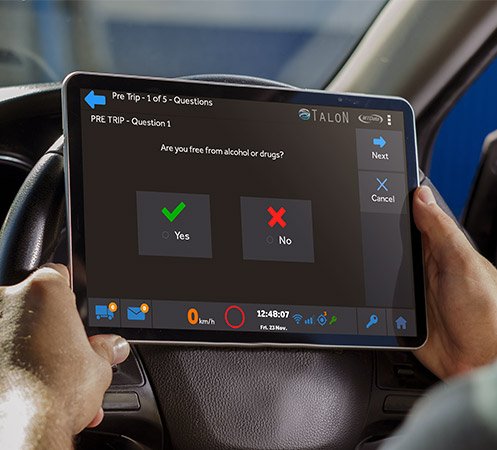
Are monitoring devices good for the company?
Transport companies could benefit from devices to monitor the behaviour of drivers, and maybe benefit the drivers with evidence of their good behaviour.
So how? When might it be good, and what are the down sides?

The height under the harbour
The height compliance debate has ramped up.
Many drivers seem to ignore all the height regulation signs, and run right through hanging height indicators, to then wedge themselves in the tunnel.

What the HVIS Survey Report showed us about driver conditions.
In April the 2022 Heavy Vehicle Industry Safety Survey Report was released.
What it showed was that there were significant improvements on all things that a company can take direct action, which is a good sign that companies are taking matters like driver fatigue seriously, and taking that into account when managing driver schedules.

Is R.U.O.K. Day okay?
Trucking has always been associated with some pretty hard characters. The attribute tested most is mental toughness. Long hours concentrating on the road alone is enough to make a person crack.

The Eastern Freeway crash, and Chain of Responsibility.
When management is left to structure its own organisation, naturally people at the top will acquire authority, and will shift responsibility away from themselves, downwards to the people doing the actual work.
This is why the old-school top-down approach causes so many disasters. They will not take on that responsibility, turn a blind eye and will use their authority to stop even hearing about issues of concern.

How will the HVNL affect small business?
With the new rules around the Heavy Vehicle National Law, some have pointed to the concern that this responsibility restructure, and heavy fines to the businesses, will unduly affect smaller operators.

Qualification vs skill - If it looks the same, is it the same?
Consider this scenario: You send a person off to a training course and they get a qualification through recognition of prior learning (RPL). This means they are now qualified, right? But are they now also skilled?
Well, it depends!

How good compliance builds better workplace culture.
Have you ever noticed that some companies have a great culture full of staff happy to be there, willing to support each other and to put in extra effort for the team?

Reducing the cost of (Non-)Compliance?
Ensuring your company is compliant will cost time and money in establishing processes and systems to ensure compliance and conducting audits required by your suppliers and customers.
This proactive investment in compliance ensures safe work practices in your company and safety of your employees and the public your company crosses paths with in the daily running of its business.

Stay ahead by turning qualifications into skills
Many have noted how short a life span academic knowledge has once you enter the workforce. You are not long in the job before what you learned in theory becomes replaced by practical work skills.
Failing the test as quick profits take priority over skilled job needs.
TAFES are failing to create long-term benefits for students and the economy by churning out courses that prioritise “short-term profit”. A critical review of the skills sector has found a third of Victorian adults have a Vocational Education and Training qualification as their highest learning level. But those learners were paying “widely different fees for courses that don’t always guarantee a good job today, or a ticket into the transformed labour market of tomorrow”.
